-
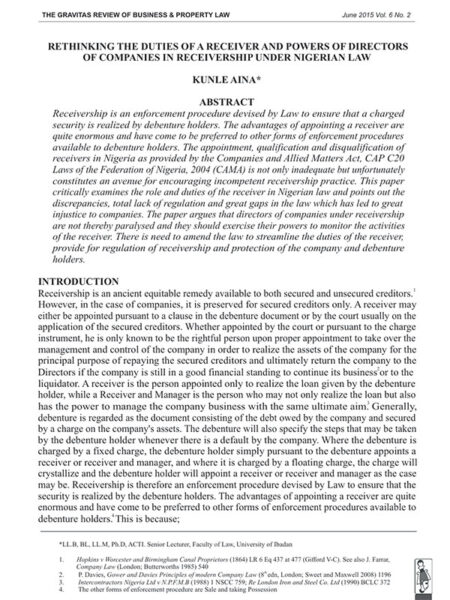
Rethinking the Duties of a Receiver and Powers of Directors of Companies in Receivership under Nigerian Law
0₦2,500.00Kunle Aina, Senior Lecturer, Faculty of Law, University of Ibadan, critically examines the role and duties of the receiver in Nigerian law and points out the discrepancies, total lack of regulation and great gaps in the law which has led to great injustice to companies. Rethinking the Duties of a Receiver and Powers of Directors of Companies in Receivership under Nigerian Law argues that directors of companies under receivership are not thereby paralysed and they should exercise their powers to monitor the activities of the receiver. There is need to amend the law to streamline the duties of the receiver, provide for regulation of receivership and protection of the company and debenture holders.
-
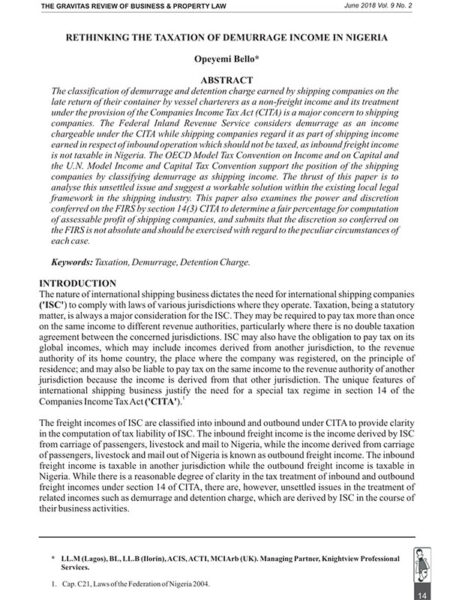
Rethinking the Taxation of Demurrage Income in Nigeria
0₦2,500.00Opeyemi Bello, Managing Partner, Knightview Professional Services in Rethinking the Taxation of Demurrage Income in Nigeria, observes that the classification of demurrage earned by shipping companies on the late return of their containers by charterers as a non-freight income, and its treatment under the provision of the Companies Income Tax Act (CITA) is a major concern to shipping companies; while the Federal Inland Revenue Service (FIRS) considers demurrage as an income chargeable under the CITA, the shipping companies regard it as part of shipping income earned in respect of inbound operation which is not taxable in Nigeria. Bello analyses this unsettled issue, and the discretion conferred on the FIRS by section 14(3) CITA to determine a fair percentage for computation of assessable profit of shipping companies, and suggests a workable solution within the existing legal framework.
-
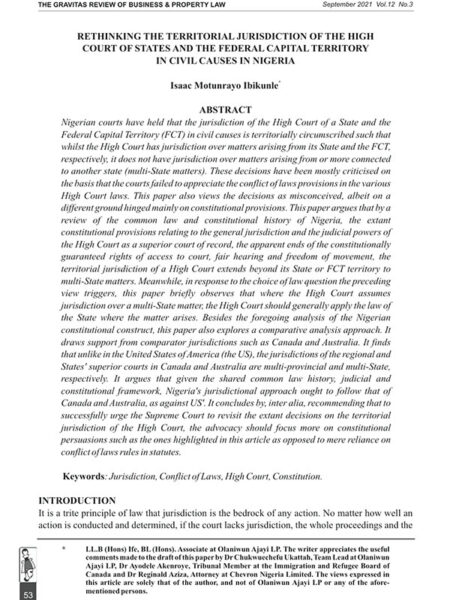
Rethinking the Territorial Jurisdiction of the High Court of States and the Federal Capital Territory in Civil Causes in Nigeria
0₦2,500.00Isaac Ibikunle, Associate at Olaniwun Ajayi LP, in his article, Rethinking the Territorial Jurisdiction of the High Court of States and the Federal Capital Territory in Civil Causes in Nigeria, notes that the extant position of Nigerian courts is that a State High Court does not have jurisdiction over matters arising from or more connected to another state (multi-State matters). He argues that this stance has been criticised because the courts failed to appreciate the conflict of laws provisions in the various High Court laws. From a review of the common law and constitutional history of Nigeria, Ibikunle opines that the territorial jurisdiction of a High Court should extend beyond its State to multi-State matters. He concludes with a recommendation that the Supreme Court should revisit the extant decisions on the territorial jurisdiction of the High Court on multi-State matters by aligning with the Canadian and Australian approaches on the issue.
-
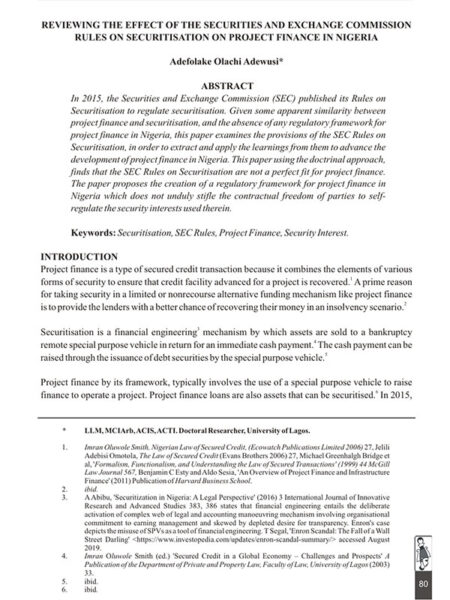
Reviewing the Effect of the Securities and Exchange Commission Rules on Securitisation on Project Finance in Nigeria
0₦2,500.00Adefolake Adewusi, Doctoral Researcher at the University of Lagos in her article, Reviewing the Effect of the Securities and Exchange Commission Rules on Securitisation on Project Finance in Nigeria, posits that the Securities and Exchange Commission (SEC) published its Rules on Securitisation in 2015 to regulate securitisation. Given the apparent similarity between project finance and securitisation, and in the absence of any regulatory framework for project finance in Nigeria. Adefolake examines the provisions of the SEC Rules on Securitisation to extract and apply the principles from them to advance the development of project finance in Nigeria. She argues that the SEC Rules on Securitisation are not a perfect fit for project finance and propose the creation of a regulatory framework for project finance in Nigeria which does not unduly stifle the contractual freedom of parties to self-regulate the security interests used.
-

Revisiting MT Eyuwa vs. Inspector General of Police: The Imposition of “Juridical Personality” on a Ship – A Shibboleth?
0₦2,500.00Dr. Osinuga, in his article, Revisiting MT Eyuwa vs. Inspector General of Police: The Imposition of “Juridical Personality” on a Ship – A Shibboleth? revisits the legal concept of ascribing legal personality to a ship in the light of the recent decision of the Nigerian Court of Appeal in MT Eyuwa v Inspector General of Police, that a ship has legal personality. The article suggests that the concept of a vessel’s legal personality may have been misunderstood by the appellate court.
-
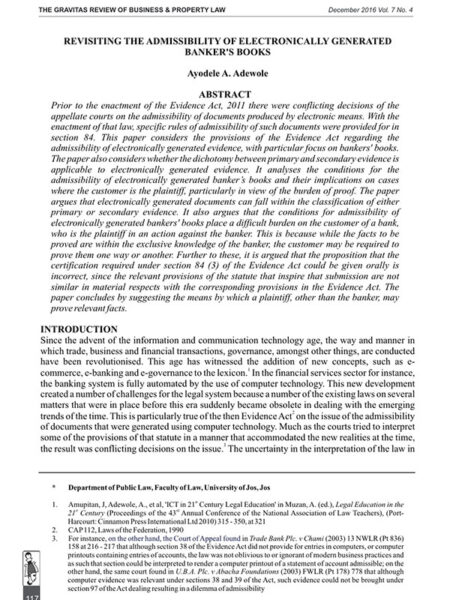
Revisiting the Admissibility of Electronically Generated Banker’s Books
0₦2,500.00Ayodele Adewole of the Department of Public Law, University of Jos in his rivetting article “Revisiting the Admissibility of Electronically Generated Bankers’ Books” analyses the provision of the Evidence Act, 2011 as it relates to the admissibility of electronically generated documents, especially bankers’ books. He considers whether the dichotomy between primary and secondary evidence is applicable to electronically generated evidence. He argues that the requirement for certification under section 84 places a difficult burden on the customer of a bank, who is the plaintiff in an action against the banker and has to prove a fact within the exclusive knowledge to the banker, who generates, stores and has custody of the record. In such a case, the interests of the party seeking to prove, and that of the party against who the document is sought to be proved is not coterminous, thereby resulting in frustration for the party seeking to prove the fact.
-
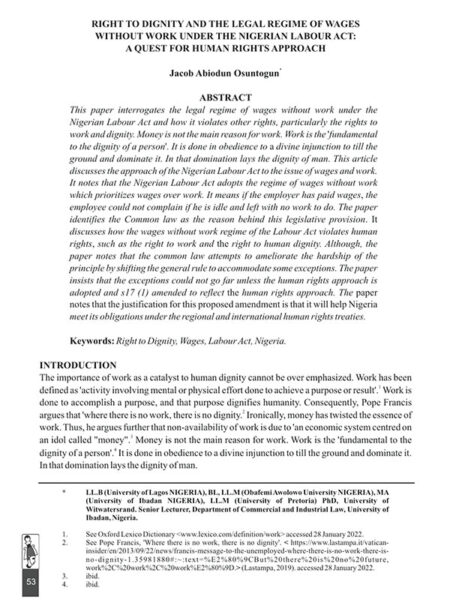
Right to Dignity and the Legal Regime of Wages Without Work Under the Nigerian Labour Act: A Quest for Human Rights Approach
0₦2,500.00Dr Jacob Osuntogun, Senior Lecturer, Department of Commercial and Industrial Law, University of Ibadan Nigeria, in his paper, Right to Dignity and the Legal Regime of Wages Without Work Under the Nigerian Labour Act: A Quest for Human Rights Approach, interrogates the legal regime of wages without work under the Nigerian Labour Act and how it violates other rights, particularly the rights to work and dignity. He argues that ‘money is not the main reason for work’ and work is fundamental to a person’s dignity. Dr Osuntogun notes that the Nigerian Labour Act prioritises the payment of wages. If the employer has paid wages, the employee could not complain if he is idle and left with no work to do. He argues that the wages without work regime of the Labour Act violates human rights and advocates an amendment of the Labour Act for Nigeria to meet its obligations under regional and international human rights treaties.
-
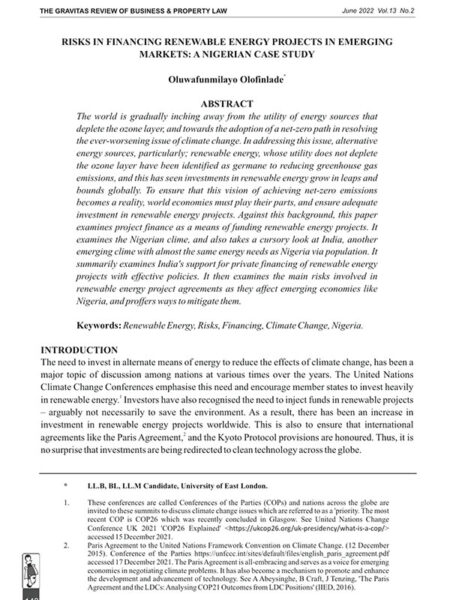
Risks in Financing Renewable Energy Projects in Emerging Markets: A Nigerian Case Study
0₦2,500.00Oluwafunmilayo Olofinlade of the University of East London UK, in her paper, Risks in Financing Renewable Energy Projects in Emerging Markets: A Nigerian Case Study, notes that the world is inching away from the use of energy sources that deplete the ozone layer and towards the adoption of a net-zero path in resolving the ever-worsening issue of climate change. Alternative energy sources whose utility does not deplete the ozone layer have been identified as germane to reducing greenhouse gas emissions. This has seen remarkable investments in renewable energy globally. Oluwafunmilayo examines renewable energy financing in Nigeria. She considers the main risks involved in renewable energy project agreements as they affect emerging economies like Nigeria and proffers ways to mitigate them.
-
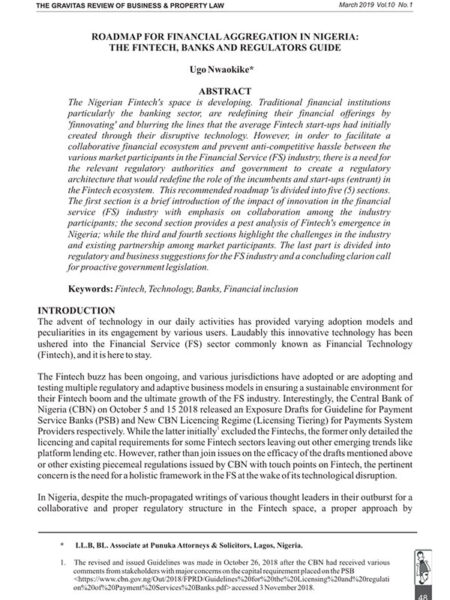
Roadmap for Financial Aggregation in Nigeria: The Fintech, Banks and Regulators Guide
0₦2,500.00Ugo Nwaokike, Associate<, Punuka Attorneys and Solicitors in his article, Roadmap for Financial Aggregation in Nigeria: The Fintech, Banks and Regulators Guide, considers that traditional financial institutions are redefining their offerings to overcome the initial head start fintech start-ups had with their disruptive technology. However, to facilitate a collaborative financial ecosystem and prevent anti-competitive hassle between the various market participants in the financial services industry, there is a need for a regulatory architecture that would redefine the role of the incumbents and entrants in the fintech ecosystem. He examines the challenges in the fintech industry and existing partnership among participants while recommending legislative, regulatory and business measures to achieve a collaborative and cohesive industry.
-
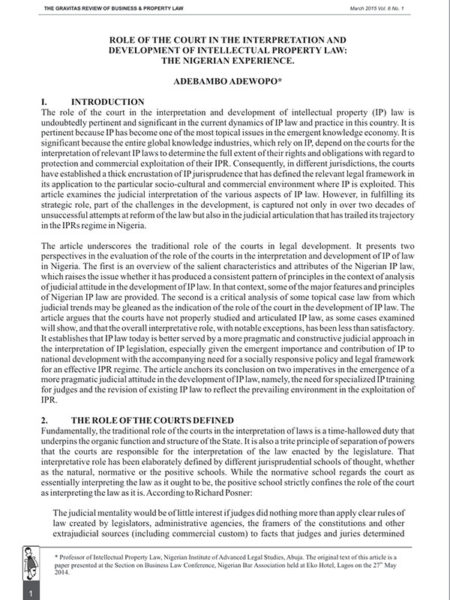
Role of the Court in the Interpretation and Development of Intellectual Property Law: The Nigerian Experience
0₦2,500.00Adebambo Adewopo, Professor of Intellectual Property Law, Nigerian Institute of Advanced Legal Studies, in an insightful tour de force explores the historical development of intellectual property law in Nigeria in “Role of the Court in the Interpretation and Development of Intellectual Property Law: The Nigerian Experience”.
-
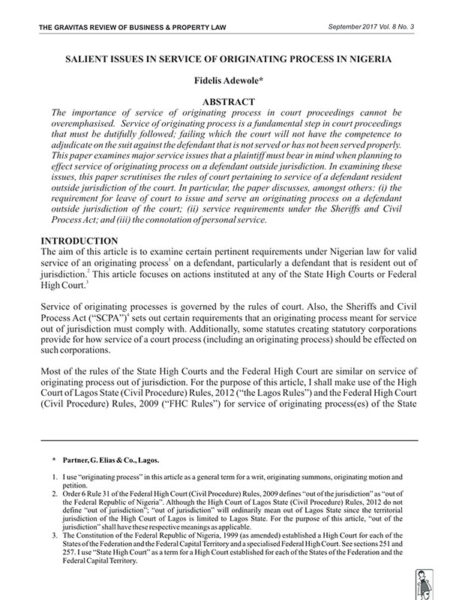
Salient Issues in Service of Originating Process in Nigeria
0₦2,500.00Fidelis Oyewole, Partner, G. Elias & Co in his article, “Salient Issues in Service of Originating Process in Nigeria” explores the world of service of originating processes with a compendium of rules and rulings, to help the practitioner navigate the somewhat arcane terrain of service. In particular, he scrutinises the rules of court pertaining to service of a defendant resident outside jurisdiction, the requirement for leave of court to issue and serve a defendant outside jurisdiction, service requirements under the Sheriffs and Civil Process Act, and the connotation of personal service.
-
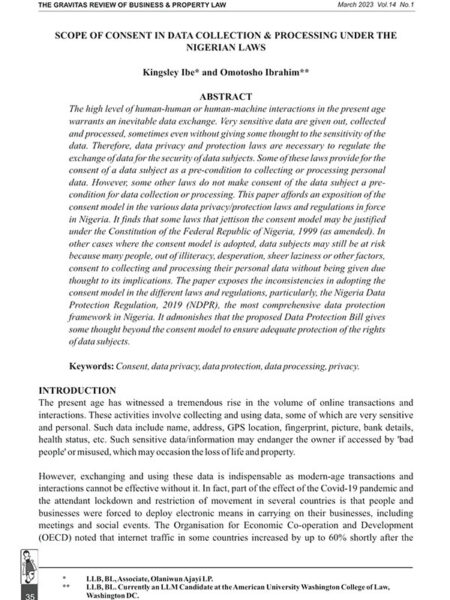
Scope of Consent in Data Collection and Processing under the Nigerian Laws
0₦2,500.00Kingsley Ibe and Omotosho Ibrahim, in their article Scope of Consent in Data Collection and Processing under the Nigerian Laws provide an exposition to the consent model in the various data privacy/protection laws and regulation in force in Nigeria. Some of the laws which jettison the consent model may be justified under the Constitution of the Federal Republic of Nigeria, 1999 (as amended). In other cases were the consent model is adopted, data subjects may still be at risk because many people, out of illiteracy, desperation, sheer laziness or other factors, consent to the collection and processing of their personal data without given due thought to its implications. Ibe and Ibrahim expose the inconsistencies in the adoption of the consent model in the different laws and regulations, particularly, the Nigeria Data Protection Regulation, 2019 (NDPR) which is the most comprehensive data protection framework in Nigeria. Ibe and Ibrahim admonish that the proposed Data Protection Bill give some thought beyond the consent model to ensure adequate protection of the rights of data subjects.
The Gravitas Review of Business & Property Law



